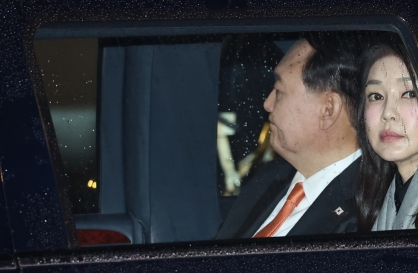TOKYO (AFP) ― A Japanese wrestler-turned-politician hopes his vision of “sports diplomacy” can repair his country’s fraught relationship with North Korea, as he prepares to host an extraordinary sporting event in Pyongyang.
And Kanji “Antonio” Inoki has form: He helped secure the release of Japanese hostages in Iraq in 1990 after impressing tyrant Saddam Hussein, and more recently used his old bouts with Pakistani wrestlers to foster goodwill between the South Asian country and his own.
Standing 1.9 meters tall, with a square jaw and a penchant for red scarves, Inoki is instantly recognizable on Japanese television, but is best known abroad for taking on world heavyweight champion Muhammad Ali in a zany wrestler-versus-boxer match in Tokyo in 1976.
The grappler also organized and competed in a “Sports and Cultural Festival for Peace” in Pyongyang in 1995, featuring bouts between Japanese and American pro wrestlers publicly staged for the first time in the reclusive country, with an ailing Ali as a guest.
And Kanji “Antonio” Inoki has form: He helped secure the release of Japanese hostages in Iraq in 1990 after impressing tyrant Saddam Hussein, and more recently used his old bouts with Pakistani wrestlers to foster goodwill between the South Asian country and his own.
Standing 1.9 meters tall, with a square jaw and a penchant for red scarves, Inoki is instantly recognizable on Japanese television, but is best known abroad for taking on world heavyweight champion Muhammad Ali in a zany wrestler-versus-boxer match in Tokyo in 1976.
The grappler also organized and competed in a “Sports and Cultural Festival for Peace” in Pyongyang in 1995, featuring bouts between Japanese and American pro wrestlers publicly staged for the first time in the reclusive country, with an ailing Ali as a guest.

Inoki’s latest venture will bring 21 combatants from Japan, the United States, France, Brazil and China to the “International Pro Wrestling Festival” at the North Korean capital’s 20,000-seat Ryugyong Chung Ju-yung Stadium on Aug. 30 and 31.
They include American Bob Sapp and Frenchman Jerome Le Banner, according to Inoki’s office, which will cohost the event with North Korean authorities.
Sideshows in the Korean combat sport of taekwondo and other martial arts will also feature.
“We have basically and always aimed to create as favorable an environment as possible” for bilateral ties, said Inoki, who has visited Pyongyang 29 times since 1974 to build connections with North Korea, the birthplace of his late wrestling mentor, known by the ring name of Rikidozan.
“Government-level talks should go into depth as soon as possible. I believe the best solution is that Prime Minister (Shinzo) Abe visits,” Inoki said.
The event was announced last month, just days after Tokyo revoked some unilateral sanctions including curbs on travel against the isolated state, to reward its decision to relaunch a probe into the fate of Japanese kidnapped by North Korean agents in the 1970s and 1980s.
After the travel ban was eased, Inoki led a group of lawmakers on a visit to the North and talked with officials on ways to solve the abduction issue and promote exchanges.
North Korea is expected to make public the result of the probe in September amid rumors Abe will travel to Pyongyang if the communist state makes a major announcement.
For Inoki, sport’s ability to transcend nationality and ideology make it especially suitable as a catalyst for greater cooperation on sensitive issues with the secretive nation.
“Sport is something that cannot be rejected even in a closed society,” said the politician, 71, who retired from wrestling in 1998 and has been elected twice to Japan’s upper house of parliament since 1989. “I think people over there keep some of their doors open through sport.”
His unique approach made headlines in 1990, when he helped secure the release of 41 Japanese hostages in Iraq during the Gulf War after meeting Saddam Hussein’s son and staging a wrestling show in Baghdad.
Inoki converted to Islam the same year, taking the name Muhammad Hussain during the hostage-rescue visit as he had been reportedly advised that being Muslim would be helpful for his contact with Iraqi leaders.
“I have not yet become a full-fledged Muslim. I drink alcohol once in a while and I do not have four wives yet,” he told the Foreign Correspondents Club of Japan in August 2013.
Elsewhere, he famously fought Pakistani wrestler and national hero Akram Pehlwan in Karachi in 1976, and has since tried hard to promote bilateral relations with Pakistan, leading a team of Japanese grapplers in late 2012 to an international wrestling event in troubled Peshawar that was once again aimed at promoting peace.
Back in Tokyo, Inoki heads a non-profit organization aimed at establishing sports-based international exchanges, which opened an office in Pyongyang last year.
North Korea’s Kim Jong-un has a keen interest in sport, and since he assumed power in 2011 has built up a surprising and at times controversial friendship with eccentric former U.S. basketball star Dennis Rodman.
Inoki will be hosted in Pyongyang by Kang Sok-ju, a seasoned diplomat and Workers Party secretary seen as a trusted aide to Kim as well as his late father Kim Jong-il and grandfather Kim Il-sung, who founded the communist dynasty.
But the wrestler, like Rodman, is accused of naivete by critics: the country has been ruled for more than six decades by the Kim family, and the sometimes flamboyant welcome laid on for sports stars belies evidence of rampant rights abuses and zero tolerance for political dissent.
-
Articles by Korea Herald



![[AtoZ Korean Mind] Does your job define who you are? Should it?](http://res.heraldm.com/phpwas/restmb_idxmake.php?idx=644&simg=/content/image/2024/05/06/20240506050099_0.jpg&u=)















![[K-pop's dilemma] Is Hybe-Ador conflict a case of growing pains?](http://res.heraldm.com/phpwas/restmb_idxmake.php?idx=642&simg=/content/image/2024/05/07/20240507050746_0.jpg&u=)